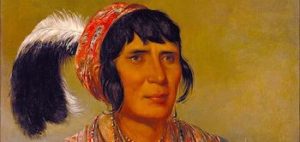
Osceola
*The birth of Osceola, who was born on this date in 1804, is celebrated. He was a Native leader and interpreter of the Seminole people in Florida.
Pronounced Asi-yahola in Creek), Osceola was named Billy Powell at birth in the Creek village of Talisi, which means "Old Town." The village site, now the city of Tallassee, Alabama, was located on the banks of the Tallapoosa River about 20 miles upstream from Fort Toulouse, where the Tallapoosa and the Coosa Rivers meet to form the Alabama River. The residents of the original Talisi village and the current city of Tallassee were a mixture of several ethnicities.
The Muscogee Creek were among the Indigenous peoples of the Southeastern Woodlands, and some of them held African slaves. Powell was believed to have ancestors from all of these groups. His mother was Polly Coppinger, a mixed-race Creek woman, and his father was likely William Powell, a white-Scottish trader. His uncle was the Black Seminole leader Abraham. Osceola’s mother was also of Muscogee and Taino ancestry.
Because the Muscogee had a matrilineal kinship system, Polly and Ann's children were all born into their mother's clan. They were reared by their mothers and maternal male relatives following Muscogee cultural practices, and they gained their social status from their mother's people. Ann McQueen was also African, Muscogee Creek; her father, James McQueen, was Scottish. Ann was probably the sister or aunt of Peter McQueen, a prominent Muscogee leader and warrior. Like his mother, Billy Powell was raised in the Muscogee Creek confederacy.
Billy Powell's maternal grandfather, James McQueen, was a ship-jumping Scottish sailor who 1716 became the first recorded white to trade with the Muscogee Creek Confederacy in Alabama. As a fur trader, he stayed in the area and married into a Muscogee family, becoming closely involved with these people. He was buried 1811 at the Indian cemetery in Franklin, Alabama, near a Methodist Missionary Church for the Muscogee. 1814, after United States forces defeated the Red Stick Muscogee Creeks, Powell’s mother took him and moved with other Muscogee refugees from Alabama to Florida, where they joined the Seminole. In adulthood, as part of the Seminole, Powell was named Osceola.
In 1821, the United States acquired Florida from Spain, and more white-European-American settlers started moving in, encroaching on the Seminoles' territory. After early military skirmishes and the signing of the 1823 Treaty of Moultrie Creek, by which the US seized the northern Seminole lands, Osceola and his family moved with the Seminole deeper into the unpopulated wilds of central and southern Florida. Osceola took two wives as an adult as did some other high-ranking Muscogee and Seminole leaders. With them, he had at least five children. One of his wives was Black African, and Osceola fiercely opposed the enslavement of free people.
He also became an adviser to Micanopy, the principal chief of the Seminole from 1825 to 1849. In 1836, Osceola led a small group of warriors in the Seminole resistance during the Second Seminole War, when the United States tried to remove the tribe from their lands in Florida. This evolved into the Indian Removal Act to relocate the tribes to Indian Territory west of the Mississippi River. Osceola led the Seminole resistance to removal until he was captured on October 21, 1837, by deception, under a flag of truce, when he went to a site near Fort Peyton for peace talks.
The United States first imprisoned him at Fort Marion in St. Augustine and then transported him to Fort Moultrie in Charleston, South Carolina. Because of his reputation, Osceola attracted visitors in prison, including artist George Catlin, who painted perhaps the most well-known portrait of the Seminole leader. Osceola, having suffered from chronic malaria since 1836, died on January 30, 1838, three months after his capture. He was buried with military honors at Fort Moultrie.